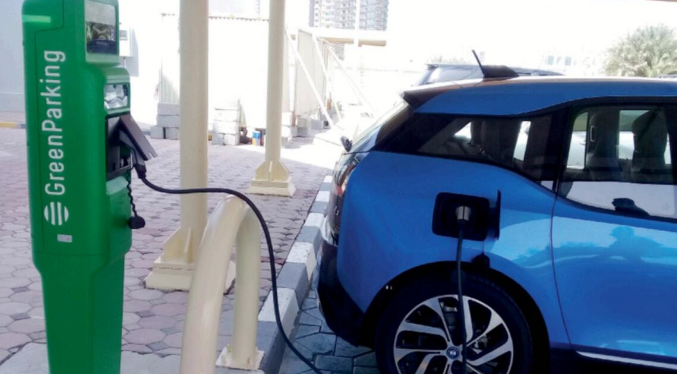UAE Regulations on Electric Vehicles
The former Emirates Authority for Standardization and Metrology (ESMA) developed draft standards for electric vehicles in the UAE, which was raised to the Gulf Cooperation Council Standard Organization (GSO) for approval and implementation across the GCC. Currently, conformity certificates are provided to automotive manufacturers and traders to allow specific EV models to enter the UAE market by the Ministry of Industry and Advanced Technology. Automotive manufacturers and traders can apply here for this certificate.
The steps to register for this service including the following
Dubai Regulations on Electric Vehicle Charging Stations

The Emirate of Dubai has introduced its Green Building Regulations and Specifications for new buildings, through Dubai Municipality, which specifies that 5% of parking spaces should be dedicated to green or low emission vehicles. Moreover, as part of the Al Sa’fat – Dubai Green Building System, designated preferred parking must be provided for a combination of hybrid vehicles, electric vehicles and carpool vehicles. To achieve the Silver ranking a minimum of 5% of parking spaces should be dedicated to these vehicles, while for the Gold and Platinum rankings a minimum of 7% and 10% of dedicated parking is required respectively. Additionally, the Dubai Building Code provides guidelines and requirements for electric vehicle charging points in Dubai.
His Highness Sheikh Ahmed bin Saeed Al Maktoum, Chairman of the Dubai Supreme Council of Energy, issued Directive number 1 of 2017 on the establishment and installation of electric vehicle charging stations in the Emirate of Dubai, which states the following:
All public and private organisations and developers in the Emirate of Dubai are required to obtain approvals from Dubai Electricity and Water Authority (DEWA) before establishing, installing, operating or maintaining any electric vehicle charging station. In turn, DEWA will coordinate with Dubai Municipality (DM) and the Roads and Transport Authority (RTA) to ensure that electric vehicle charging stations meet the technical requirements and standards adopted by the relevant authorities.
The selling of electricity from electric Vehicle (EV) charging stations is governed by a specific tariff imposed by Dubai Government and implemented by DEWA. Moreover, DEWA has established a comprehensive regulatory framework for the development and operation of EV charging infrastructure across Dubai. The EV Charging Infrastructure Regulation for the Emirate of Dubai was introduced on September 30th, 2024. To operate public electric vehicle charging infrastructure, independent charge point operators must be licensed by DEWA.
Abu Dhabi Regulations on Electric Vehicle Charging stations
The Emirate of Abu Dhabi has introduced a government framework with a specified tariff for electric vehicle charging within the Emirate. All electric vehicle charging stations in Abu Dhabi are required to be registered with the Abu Dhabi Distribution Company (ADDC) or the Al Ain Distribution Company (AADC). Following registration, a flat monthly fee of AED 92 is applied to all EV charger owners until a meter is installed by the utility. After the installation of the meter, billing is based on actual consumption. The Department of Energy has also introduced a regulatory policy for electric vehicle charging infrastructure in the Emirate of Abu Dhabi, which sets out the fundamental principles for ownership, installation and management of electric vehicle supply equipment (EVSE), the electricity supply to EVSE, and pricing mechanism to end customers.

